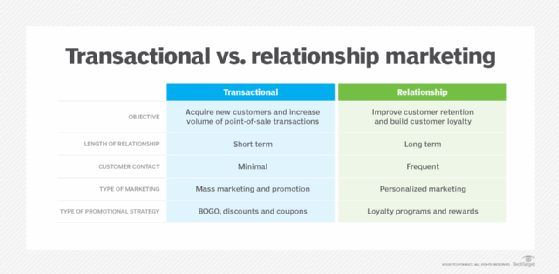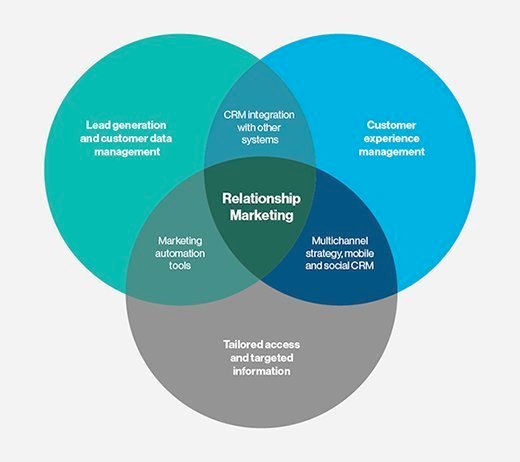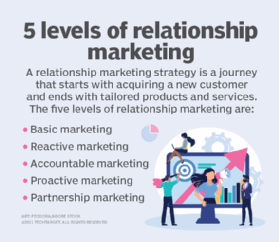What is relationship marketing?
Relationship marketing is a facet of customer relationship management (CRM) that focuses on customer loyalty and long-term customer engagement rather than shorter-term goals like customer acquisition and individual sales. The goal of relationship marketing is to create strong, emotional, customer connections to a brand. Such connections can lead to ongoing business, free word-of-mouth promotion and information from customers that can generate leads.
Relationship marketing stands in contrast to the more traditional transactional marketing approach, which focuses on increasing the number of individual sales. The transactional model can fall short when it comes to the return on customer acquisition cost. A customer engages with a brand one time, but without a strong relationship marketing strategy, they don't come back to the brand in the future.
Organizations often combine elements of both relationship and transactional marketing. However, relationship marketing is starting to play a more important role for many companies.

Why is relationship marketing important?
Acquiring new customers is challenging and costly. Relationship marketing efforts help retain customers over the long term, resulting in customer loyalty rather than customers purchasing once or infrequently.
Relationship marketing keeps an organization or business in close contact with current customers. It gets organizations to understand how their customers use the brand's products and services. It also forces the business to identify unmet customer needs that the brand can create new features and offerings to meet, further strengthening relationships.

What are the levels of relationship marketing?
Relationship marketing involves ongoing interaction between a customer and an organization. Initially, products and services are marketed to customers through basic, more traditional approaches. Then, as the relationship advances, more advanced and personal strategies are used to ensure a long-lasting relationship.
The five levels of relationship marketing represent each stage in the customer's journey:
- Basic marketing. A business promotes its product or service to customers and builds a customer base.
- Reactive marketing. The organization requests feedback from customer on how the product or service is working and meeting their needs.
- Accountable marketing. Interaction between the organization and the customer intensifies. Customers are notified that their feedback is being taken into consideration and any problems they identified are being addressed. Organizations also check in to see if the product or service is continuing to meet the customer's needs.
- Proactive marketing. Interactions with customers occur more frequently. Changes are made to products and services based on customer feedback and suggestions.
- Partnership marketing. With ongoing, frequent interaction, both the customer and the organization focus on ensuring a long-term relationship. These partnerships are often publicly promoted to build brand awareness.

Benefits of relationship marketing
The benefits of customer relationship marketing include the following:
- Higher customer lifetime value (CLV). Relationship marketing creates a loyal customer base, which leads to repeat purchases and a higher CLV. In addition, loyal customers are likely to become brand advocates or ambassadors who recommend the products and services to friends, family and business associates.
- Reduction in marketing and advertising spending. Spending on marketing and advertising to acquire new customers is expensive. Relationship marketing causes customers to do the marketing for a brand through what's known as buzz marketing. Customers tell others about a brand's products and services, which can drive sales. Brands with exceptional relationship marketing programs spend little to no money on marketing and advertising.
- Stronger organizational alignment with the customer. Organizations that emphasize relationship marketing have a stronger organizational focus on creating an exceptional customer experience. Teams work to have satisfied and happy customers over the long term.
- Competitive advantage. Having a strong relationship marketing strategy, is one way to stay ahead of competitors and boost customer retention rates.
- Increased customer satisfaction and positive reviews. Positive customer experiences will lead to positive social media and other reviews. These increase an organization's ability to attract more loyal customers.
Challenges of relationship marketing
Alongside these benefits come challenges as well, including the following:
- Employee training. Relationship marketing means mastering multiple social media platforms and tools to reach customers. An organization attempting to create an omnichannel marketing approach must ensure employees are trained to use these platforms and tools, and understand their role in the marketing program.
- Customer interest. Even long-time customers can be hard to hold on to if competitors present their own compelling relationship marketing strategies.
- Personalized customer experiences. Tailoring outreach to individual customers takes effort. These marketing campaigns require an organization to obtain and analyze data about their customers, such as purchase data, and then use these metrics to craft individual outreach efforts.
- Infrastructure requirements. An organization could need specific CRM tools, as well as data analytics and data storage platforms, to carry out its relationship marketing strategy. The associated costs and effort to set up this infrastructure can prove challenging.
Reasons to implement a relationship marketing strategy
Relationship marketing is based on the tenets of customer experience management. CXM focuses on improving customer satisfaction to foster brand loyalty. While these interactions can occur in person or over the phone, much of relationship marketing and CXM is now done on the web.
Consumers expect to have easy access to details about a brand and even expect the opportunity to influence products and services via social media referrals and online reviews. Modern relationship marketing involves creating two-way communication between customers and the business, tracking customer activities and providing personalized information to existing customers based on those activities.
For example, e-commerce sites let customers set up user profiles where their information is saved for future visits. This lets the business track a customer's activity and push tailored information to them. Site visitors can sign in through Facebook or other social media platforms, providing a simpler user experience and automatically connecting them to the brand's social media presence.
CRM and marketing automation software make it easy to record, track and act on customer information in ways that support a relationship marketing strategy. Social CRM tools help to extend relationship marketing into the social media sphere, enabling companies to more easily monitor and respond to customer issues on social media channels.
Examples of relationship marketing
Companies use several types of activities to facilitate good relationship marketing and encourage customer interaction, including the following approaches:
- Provide exceptional customer service; customers who are consistently impressed with a brand's customer service are more likely to remain loyal to the brand.
- Thank customers through a social media post or with a surprise gift card.
- Solicit customer feedback through surveys, polls and phone calls to create a positive impression that customer opinions are valued and used to create better products and services.
- Launch a loyalty program that rewards customers and provides incentives for their continued patronage.
- Hold events to connect with customers and build a community.
- Create customer advocacy or brand advocacy programs to reward customers who provide word-of-mouth advertising on a brand's behalf.
- Offer discounts or bonuses to long-time or repeat customers.
Real-world examples of companies that are successfully building relationships with customers through relational marketing strategies include the following:
- American Express builds customer relationships with simple processes for opening accounts. It also offers bonuses such as travel perks through its premium cards, including hotel credits, airline fee credits and Uber Cash credits.
- Capital One prioritizes customer engagement and reimburses customers in unusual ways, such as paying the TSA PreCheck fee at airports as long as they use their Capital One cards.
- Delta Airlines bolsters customer loyalty with a rewards program for frequent customers. As with other airlines, the more times those customers fly with Delta, the more points they get that can be redeemed for free tickets. Delta's SkyMiles loyalty program offers other benefits, including waived airport fees and first-class upgrades.
- Domino's took an unconventional route when it advertised negative reviews it received from customers. This approach lets customers and potential customers know about its commitment to changing its menu and services based on the concerns expressed in those reviews.
- General Electric builds relationships with customers through a personalized content marketing effort. It reaches out to them through various forms of media, such as informative videos, podcasts and articles, to educate them and address concerns.
- Patagonia offers local clothing repairs at no charge to encourage long-term relationships with customers. It also responds to consumers' environmental concerns through sustainable marketing messages about the materials it uses to make products.
- Starbucks has a comprehensive social media and email marketing effort that reaches its customers wherever they are to inform them of new offers.
T-Mobile has a multifaceted relationship marketing approach that includes frequent rewards to customers and the option of service without a contract. With its no annual contract option, T-Mobile gives users the option of avoiding being forced into a contract and being charged extra fees.
CRM platforms are crucial to relationship marketing success. Learn about the various types of CRM platforms.







